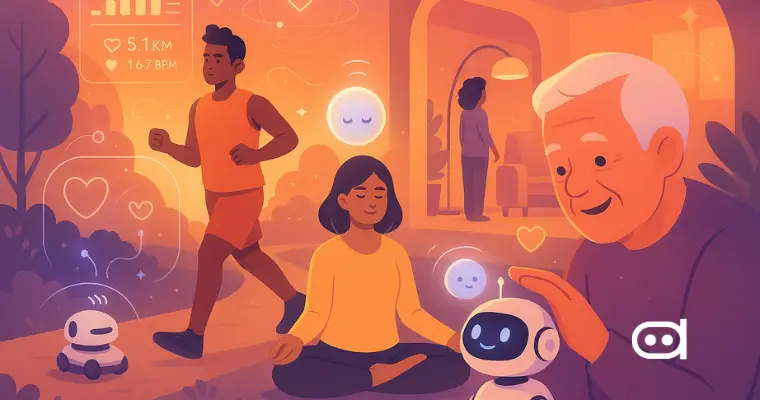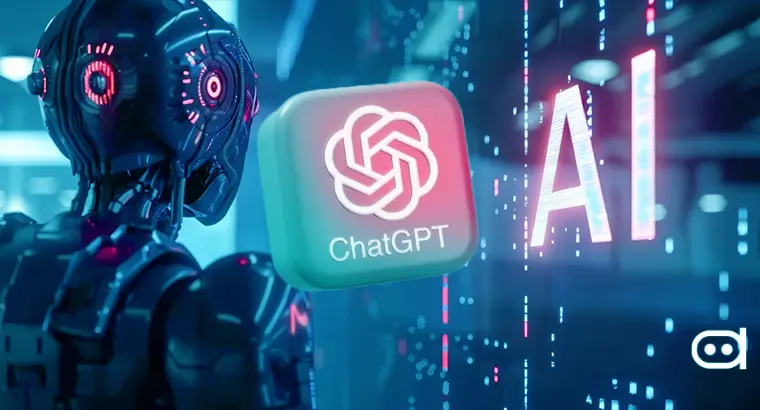
Artificial intelligence (AI), is an important part of our lives, and has significantly transformed the way we work, communicate, learn, and execute personal decisions. Apps, virtual assistants, health diagnostic systems, and smart home systems have greatly escalated the use of AI for human well-being.
Affordable computing technology has created an environment where AI has a significant influence on everyday life. Although a darker side to this exists, it would be wrong to completely ignore the impact of the technology on various physical, mental, emotional and social aspects.
Redefining Human Well-Being in the AI Era
While physical health was the central focus of wellbeing for a prolonged duration in human history, over the past few years, people have begun considering mental health as an integral component of human well-being. With rising stress, burnout, and isolation, individuals around the world are expressing concerns related to the challenges they face on a daily basis.
From fitness trackers to tools that help with customized treatment regimens and early disease identification, AI in daily life plays a pivotal role in keeping you healthy.
Adoption of such technologies has allowed 34% of the consumers to automate daily decisions and simplify health management through reminders, emotional check-ins, and well-crafted product suggestions that promote stress relief and relaxation.
AI in Physical Health & Wellness
AI in fitness
People have started to experience smart living with AI to prioritize their physical health and active lifestyles. AI fitness apps are not optional anymore but essential, with top names like Freeletics, Whoop, and Fitbod, that deliver hyper-personalized workout plans which adjust in real-time based on the users’ goals, recovery status, and performance. These apps go beyond physical training and combine fitness with mental wellness, meditation, and breath work, all combined into one single platform, supporting mental clarity and emotional resilience.
AI in healthcare
Although there are AI-powered fitness apps, the technology has much more significant contributions to healthcare. It’s being used for initial patient diagnosis, which lowers the pressure on doctors and healthcare professionals. Apart from drug discovery, AI can help with patient care and monitoring, which makes for more personalised healthcare routines.
Nutrition tracking
Modern AI-based diet and nutrition tracking apps have also created a lot of buzz, bringing forward features like macro calculation, meal suggestions, and even integration with grocery delivery services. With apps like Yazio and MyFitnessPal, users can get automated meal plans, food logs, and much more, based on their fitness preferences and goals.
AI for Mental and Emotional Well-Being
AI chatbots can now simulate human-like responses and converse with people interactively, positively impacting mental and emotional well-being. Chatbots can help users manage their feelings of loneliness, stress, and depression. For instance, chatbots like Woebot, Wysa, Vivibot, and Tess aim at alleviating mental and emotional health problems by effectively serving as tools to reduce stress, and are prime examples of AI uses in daily life. The technology has also introduced meditation and mindfulness apps like Calm and Headspace that are designed by clinical experts to help create life-changing habits that support mental and emotional health through evidence-based tools, mental health coaching, and sleep resources.
Natural Language Processing (NLP) helps analyze historical data from various sources, letting users identify emotions, patterns, and trends related to a person’s mental health. It also assists in the treatment, diagnosis, and monitoring of a person’s mental and emotional well-being by using just a mobile device.
Smart Living: AI in Home and Routine Life
It correlates with people’s behavior living there. Smart homes and IoT-powered devices create an ease of living, which reduces the stress of daily routines with automation. Adaptive lightning with cleaning robots and voice assistants has made our lives easier at home, even without being home.
While talking about financial well-being, AI is making it easier to budget and meet our financial goals by providing smart budgeting and giving indications on our spending habits. The beauty of AI used in financial well-being involves constantly learning from us and creating personal data records. This helps us better understand how to make the best financial decisions without any manual work.
Task automation automatically reminds us of our appointments when our groceries need to be ordered as stock levels decline. Some of the applications also help us stay connected with family members to coordinate household chores.
AI in Social Connectivity and Inclusion
There is no denying that AI has become an important tool for social connectivity and inclusion in all types of communities. One of the greatest benefits of AI lies in the area of accessibility. Various technologies like image recognition, voice-to-text, and real-time captioning, to name a few, are helping those who are hearing or visually impaired to get more access to information in digital forms and in their lives.
Languages have also come to play a significant role in how we communicate with one another; the accessibility tools related to languages have changed the way societies interact in the world. Now, people can connect, collaborate, and develop relationships with one another, irrespective of the language they use, with the help of AI-powered translation tools.
What’s more, AI has also helped in the fight against digital isolation, especially among older adults. AI-driven virtual assistants and social companion bots, in particular, provide reminders, emotional support, and interaction while offering a semblance of social connectedness and daily routine to those who may live alone. In elder care, AI systems have also started to monitor older adults for their well-being and look for abnormal patterns or alert caregivers to any kind of emergencies.
Future Possibilities: What’s Next for AI and Human Flourishing?
Emotionally intelligent AI is capable of recognizing, interpreting, and responding to emotional expressions, thereby helping in mental and emotional health transformation. AI systems provide customizable encouragement, help identify early signs of distress, and modify individual engagements to optimally support user purpose and activity.
Certain AI companions are specifically designed to support elderly people or individuals on the neurodiversity spectrum. They provide helpful forms of routine structure, emotional relationships for distraction, and also assist in communication needs for those who want to increase independence and alleviate loneliness. The technology is promising even for students, who want to improve academic development, allowing them to work and build motivation for learning styles, social and emotional learning, and engagement in emotions, anchored in nurturing resilient learners.
In the future, predictive AI applications capable of coaching users based on their behavioral patterns for relationships, productivity, and wellness are expected to emerge. Predictive AI systems will also facilitate users to make better decisions about their health bills, better habits, and sustained long-term principles to design their own flourishing.
Our Verdict
As AI begins to take the center stage in our lives, it’s important to understand the implications of both the positive and negative impact that it can have. Yes, there are some challenges that we’re yet to resolve, but it can help provide some solutions that can easily help us with our health and wellbeing.
While the technology definitely makes things easier, it’s important to not become overtly dependent on it. AI is best used as an assistance, because overreliance on it can be extremely harmful. Despite all the positive effects that it has, extreme dependence on it can have far reaching consequences.






